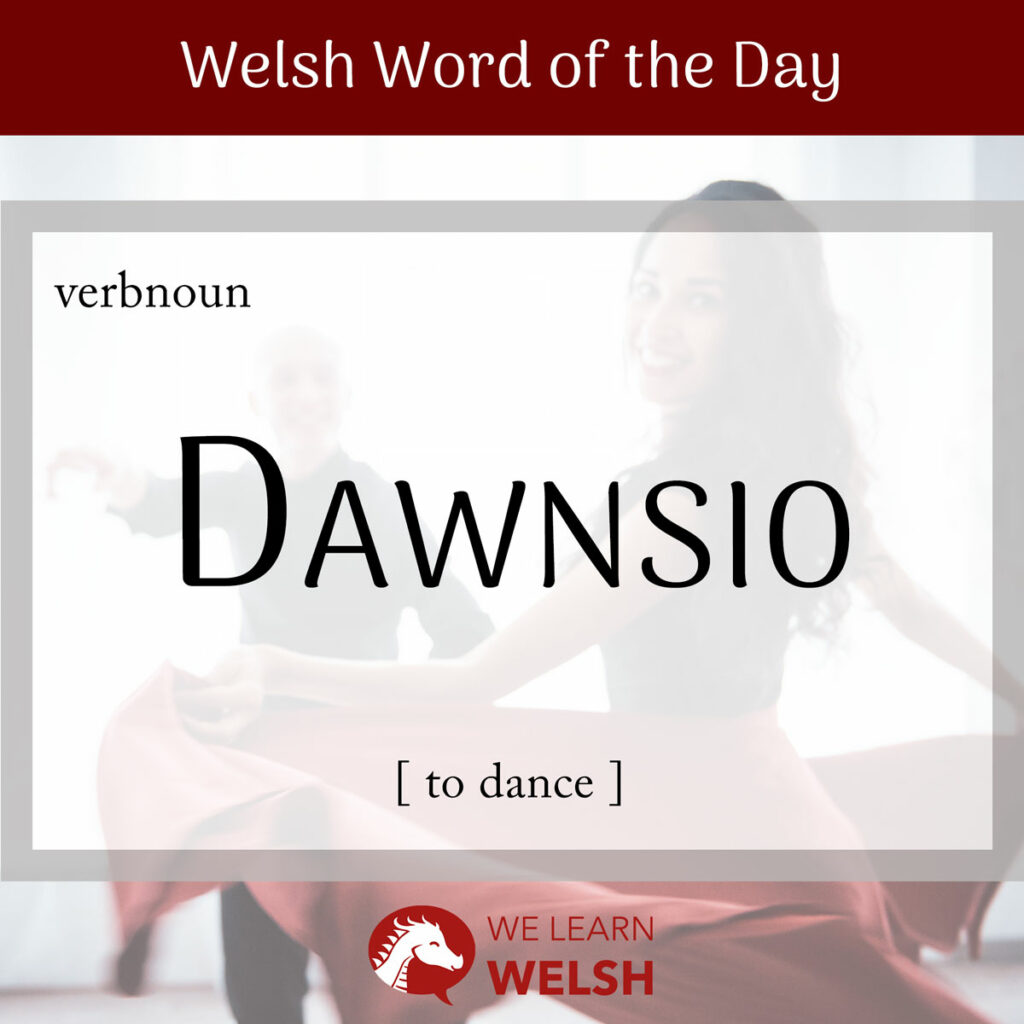There aren’t many things that evoke as much llawenydd (joy) as dawnsio (dancing), whether it’s at a clwb (club), a gwers (lesson / class), or just around your cegin (kitchen). I suppose that’s why we have the phrase dawnsio o lawenydd (to dance for joy) in both languages!
One of my favourite Welsh-language canueon (songs) is Dawnsio yn y Bore (Dancing in the Morning) by Mali Hâf, which strongly evokes this sentiment. I love how the lyrics describe the simple pleser (pleasure) of, in the artist’s own words, symudiadau rhydd (free movements). There’s actually an English language recording too, so you can compare the two and use them to learn some new vocabulary!
dawnsio
to dance
I’m sure it’s clear that it’s a close cousin of the English word dance. It’s a verb-ification of dawns (a dance or the art of dance), which itself is a loan word that has existed in Welsh since the 14th century, having been borrowed from the Middle English daunce.
Now, technically, dawnsio could undergo a soft or nasal mutation, like this:
But I can’t really think of a context where it would nasal mutate… let me know if you can! Though one could probably come up with a situation where you’d need to say fy nawns (my dance).
On the other hand, the soft mutation is significantly more common. For example, it’s used in phrases like wrth ddawnsio (while dancing / when dancing), and verbs are often soft mutated when they appear at the beginning of sentences like ddawnsiais i (I danced) or ddawnsiodd hi (she danced). This last rule is a bit of a grey area – some people follow it and some don’t, and some switch it up depending on the word!
The simplest expressions we’d see dawnsio in would be those that pair it with the linking word yn, as in:
- dw i’n dawnsio = I’m dancing / I dance
- roedden ni’n dawnsio = we were dancing
- basai o’n dawnsio = he’d be dancing
- ydych chi’n dawnsio? = are you dancing?
- petai hi’n dawnsio = if she were dancing
- maen nhw wedi bod yn dawnsio = they have been dancing
Another usage is combining it with nouns to show that their purpose is for dawnsio, as in phrases like sgidiau dawnsio (dancing shoes) or gwisg ddawnsio (a dancing dress / a dance outfit). Plus, the verb is used descriptively for other actions, for instance a ceffyl (horse) frisking is said to be dawnsio.
Dw i eisiau dysgu dawnsio’n well.
I want to learn to dance better.
Dawnsio is an important element in traditional Welsh culture. You may have heard of or even attended a ceilidh, a social gathering and organised dance event customary in Scotland and Ireland – well, Wales has pretty much the exact same thing!
It’s called a twmpath, and they’re still held to this day, often in eglwysi (churches) or ysgolion (schools). Instrumental canu gwerin (folk music) is played and attendees participate in organised dawnsiau (dances) in couples or small groups, depending on the dawns. A galwr (caller) generally announces the stepiau (steps) so that everyone can take part.
Aside from twmpathau and all kinds of dawns werin (folk dance), there as many genres of dawns as there are of cerddoriaeth (music), if not more.
- dawnsio bale = to dance ballet
- dawnsio salsa = to dance salsa
- dawnsio Lladin = Latin dancing
- dawnsio neuadd = ballroom dancing
- dawnsio gwledig = country dancing
- dawnsio haf = Maypole dancing
- dawnsio stryd = street dancing
- dawnsio modern = contemporary dancing
- dawnsio swing / dawnsio jas = jazz and swing dancing
- tapddawnsio = tap-dancing
- bolddawnsio = belly-dancing
- disgoddawnsio / dawnsio disgo = disco dancing

As you can see, a lot of the different forms of dawnsio have a very similar name in Welsh to what we’d use in English. This is generally because styles of dawns are often associated with specific countries or cultures and therefore their names tend to be loan words anyway.
Dawnsiais efo Tom yn y twmpath neithiwr.
I danced with Tom at the twmpath last night.
A good example of this would be the translation of the ten main styles of dawns you get in cystadleuaethau dawns neuadd (ballroom dance competitions) or shows like my guilty pleasure Strictly Come Dancing. They’re pretty much all just phonetic Welsh spellings of what we’d call them in English or the other languages they come from – but just for fun, I’ll leave a list here to finish.
- cha-cha / tsia-tsia
- rymba
- samba
- jeif
- paso doble
- wals / walts
- wals Fiennaidd / walts Fiennaidd
- chwimgam
- ffocstrot
- tango / tango yr Ariannin
As you can tell, there is one odd one out for which there is actually a translated version… can you guess which one it is in English?

